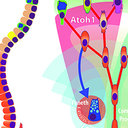Meta-analysis of the efficacy of probiotics in Helicobacter pylori eradication therapy.
Keywords
Abstract
OBJECTIVE
To evaluate the role of probiotics in the standard triple Helicobacter pylori therapy.
METHODS
In this meta-analysis, we investigated the efficacy of probiotics in a standard triple H. pylori therapy in adults. Searches were mainly conducted in MEDLINE/PubMed, EMBASE, and the Cochrane Central Register of Controlled Trials. Fourteen studies met our criteria, and the quality of these studies was assessed using the Jadad scale. We used STATA version 12.0 to extract data and to calculate the odds ratios (ORs), which are presented with the corresponding 95% confidence intervals (CIs). The data are presented as forest plots.
RESULTS
The pooled ORs for the eradication rates calculated by intention-to-treat analysis and per-protocol analysis in the probiotic group vs the control group were 1.67 (95%CI: 1.38-2.02) and 1.68 (95%CI: 1.35-2.08), respectively, using the fixed-effects model. The sensitivity of the Asian studies was greater than that of the Caucasian studies (Asian: OR = 1.78, 95%CI: 1.40-2.26; Caucasian: OR = 1.48, 95%CI: 1.06-2.05). The pooled OR for the incidence of total adverse effects was significantly lower in the probiotic group (OR = 0.49, 95%CI: 0.26-0.94), using the random effects model, with significant heterogeneity (I (2) = 85.7%). The incidence of diarrhea was significantly reduced in the probiotic group (OR = 0.21, 95%CI: 0.06-0.74), whereas the incidence of taste disorders, metallic taste, vomiting, nausea, and epigastric pain did not differ significantly between the probiotic group and the control group.
CONCLUSIONS
Supplementary probiotic preparations during standard triple H. pylori therapy may improve the eradication rate, particularly in Asian patients, and the incidence of total adverse effects.




